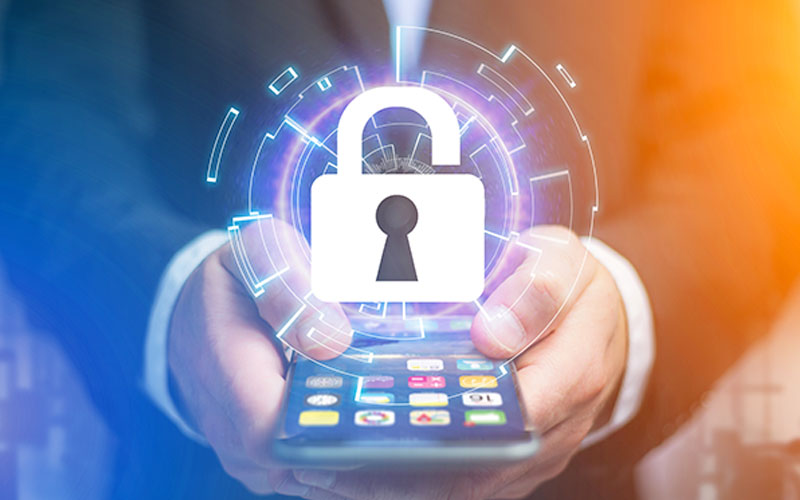Are you protecting your valuable assets? We talk security.
Yes, we know, it’s not exactly the most exciting topic of discussion, but ignore it at your peril. With more of us than ever choosing to be self-employed or run a small business, we need to be tech-savvy and understand the risks that come with not being security conscious with our personal and business data.
However, cyber security needn’t be a daunting challenge for you. Following a few quick and easy steps outlined in the guide below (which has been put together with guidance from the National Cyber Security Centre) could save time, money and even your business’ reputation. Of course, this guide can’t guarantee protection from all types of cyber attack, but the steps outlined below can significantly reduce the chances of your business becoming a victim of cyber crime.
Keeping your smartphones & tablets safe
Mobile technology is now an essential part of modern business, with more of our data being stored on tablets and smartphones. What’s more, these devices are now as powerful as traditional computers, and because they often leave the safety of the office (and home), they need even more protection than ‘desktop’ equipment.
Switch on password protection
A suitably complex PIN or password (opposed to a simple one that can be easily guessed or gleaned from your social media profiles) will prevent the average criminal from accessing your phone. Many devices now include fingerprint recognition to lock your device, without the need for a password. However, these features are not always enabled ‘out of the box’, so you should always check they have been switched on.
Make sure lost or stolen devices can be tracked, locked or wiped
Staff are more likely to have their tablets or phones stolen (or lose them) when they are away from the office or home. Fortunately, the majority of devices include free web-based tools that are invaluable should you lose your device. You can use them to:
- track the location of a device
- remotely lock access to the device (to prevent anyone else using it)
- remotely erase the data stored on the device
- retrieve a backup of data stored on the device
Keep your device up to date
No matter what phones or tablets your business is using, it is important that they are kept up to date at all times. We often avoid this as we perceive that certain things will change and be unfamiliar, however 90% of the time these changes aren’t visible but are working hard behind the scenes to protect you. All manufacturers (for example Windows, Android, iOS) release regular updates that contain critical security updates to keep the device protected. This process is quick, easy, and free; devices should be set to automatically update, where possible. Make sure any staff know how important these updates are, and explain how to do it, if necessary. Don’t put it off!
Keep your apps up to date
Just like the operating systems on your organisation’s devices, all the applications that you have installed should also be updated regularly with patches from the software developers. These updates will not only add new features, but they will also patch any security holes that have been discovered. Make sure staff know when updates are ready, how to install them, and that it’s important to do so straight away.
Be wary of public Wi-Fi hotspots
When you use public Wi-Fi hotspots (for example in hotels or coffee shops), there is no way to easily find out who controls the hotspot, or to prove that it belongs to who you think it does. If you connect to these hotspots, somebody else could access:
- what you’re working on whilst connected
- your private login details that many apps and web services maintain whilst you’re logged on
The simplest precaution is not to connect to the Internet using unknown hotspots, and instead use your mobile 3G or 4G mobile network, which will have built-in security. This means you can also use ‘tethering’ (where your other devices such as laptops share your 3G/4G connection), or a wireless ‘dongle’ provided by your mobile network. With a Plan.com business deal from Yourmobile.com you can always check your data and top up with a data boost at any time via the portal, should you be worried about running out.
What will 5G mean for small business users?
There’s a lot of talk about 5G as a consumer technology but less about business benefits. But when you start to look at the facts there’s quite a bit to get excited about!
The start with, it will certainly improve the experience of remote working and collaboration. Today, over 50 percent of staff work away from their main office at least 2.5 days a week which while giving businesses agility, improved scheduling and lower staff turnover, can make connecting, sharing and engaging teams difficult.
Less lag, more productivity
This is where 5G comes in. Network-related tasks, such as online sales or sharing large files in the cloud will become much faster and more efficient, even on mobile devices without the need to connect to WiFi, giving businesses huge productivity gains and boosting staff morale. After all, there’s nothing more frustrating than a slow internet connection.
As well as connecting people, 5G will connect things, vastly expanding the capabilities and application of connected device technology which demands better and faster connectivity. In fact, 5G will enable device-to-device communications for up to a million devices per square kilometre.
What does this mean in real business examples?
This means massive opportunities for connected devices innovation and commercial use – from driverless cars, drones, Artificial Intelligence, robotics and remote-controlled machinery, and virtual and augmented reality – giving businesses at the forefront of creating and using such technologies a competitive edge.
A very clever example of what’s possible is provided by Vodafone’s 5G connected crane, allowing an operator hundreds of miles away to have full remote control of the crane (or indeed multiple cranes in different locations). This 5G-enabled teleoperation solution could transform the construction industry and many others, increasing site safety and reducing idle time.
Will I need to change my phone to benefit from 5G?
Yes. Current 4G handsets will not work on the 5G network. There are already some 5G handsets on the market, many being announced earlier this year at Mobile World Congress. On the market today in the UK are the Samsung Galaxy S10 5G, OnePlus 7 Pro 5G, LG V50 ThinQ, Huawei Mate 20 X 5G, Xiaomi Mi Mix 3 5G, Oppo Reno 5G and Royole FlexPai. Expect more and more to become available as 5G rolls out. As yet, Apple have not released a 5G handset, with one not expected until Autumn 2020 at the earliest – some say it could even be as late as 2021, so watch this space.
How much will it cost to upgrade to 5G and is it worth it?
O2 are yet to release their tariffs, however as with any new tech, early adopters will need to pay a premium for the faster speeds. Launch tariffs with a handset on other networks are averaging around the £50-£70 per month mark depending on your inclusive data bundle size.
As with any upgrade in tech, understanding what the benefits of the faster connection will do for your business must be a deciding factor in understanding the true return on that investment. For example, an event photographer who wants to upload photos in situ to show clients will probably benefit from increased sales conversions, so the extra cost per month will more than pay for itself.







